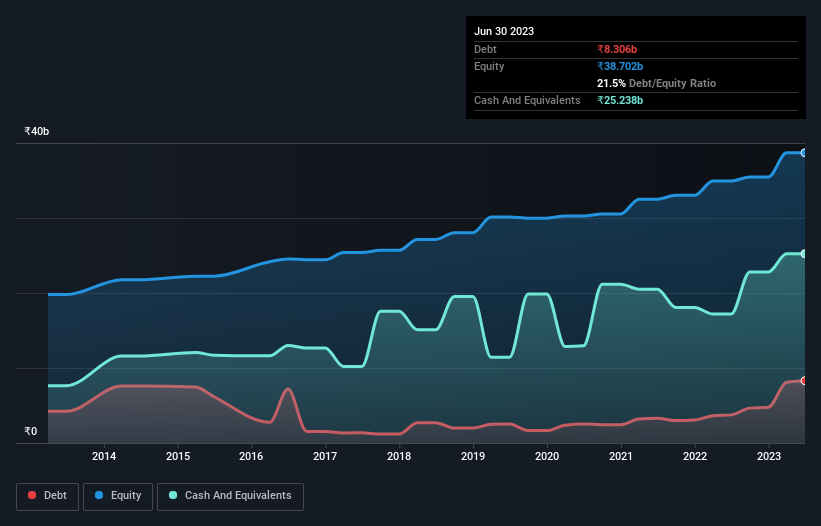These 4 Measures Indicate That Thermax (NSE:THERMAX) Is Using Debt Safely

The external fund manager backed by Berkshire Hathaway's Charlie Munger, Li Lu, makes no bones about it when he says 'The biggest investment risk is not the volatility of prices, but whether you will suffer a permanent loss of capital.' So it seems the smart money knows that debt - which is usually involved in bankruptcies - is a very important factor, when you assess how risky a company is. We note that Thermax Limited (NSE:THERMAX) does have debt on its balance sheet. But the real question is whether this debt is making the company risky.
What Risk Does Debt Bring?
Debt is a tool to help businesses grow, but if a business is incapable of paying off its lenders, then it exists at their mercy. Part and parcel of capitalism is the process of 'creative destruction' where failed businesses are mercilessly liquidated by their bankers. However, a more usual (but still expensive) situation is where a company must dilute shareholders at a cheap share price simply to get debt under control. Having said that, the most common situation is where a company manages its debt reasonably well - and to its own advantage. The first step when considering a company's debt levels is to consider its cash and debt together.
See our latest analysis for Thermax
How Much Debt Does Thermax Carry?
You can click the graphic below for the historical numbers, but it shows that as of March 2023 Thermax had ₹8.31b of debt, an increase on ₹3.75b, over one year. However, its balance sheet shows it holds ₹25.2b in cash, so it actually has ₹16.9b net cash.

A Look At Thermax's Liabilities
We can see from the most recent balance sheet that Thermax had liabilities of ₹44.1b falling due within a year, and liabilities of ₹5.59b due beyond that. Offsetting this, it had ₹25.2b in cash and ₹22.8b in receivables that were due within 12 months. So its liabilities outweigh the sum of its cash and (near-term) receivables by ₹1.64b.
Having regard to Thermax's size, it seems that its liquid assets are well balanced with its total liabilities. So while it's hard to imagine that the ₹312.1b company is struggling for cash, we still think it's worth monitoring its balance sheet. While it does have liabilities worth noting, Thermax also has more cash than debt, so we're pretty confident it can manage its debt safely.
In addition to that, we're happy to report that Thermax has boosted its EBIT by 65%, thus reducing the spectre of future debt repayments. When analysing debt levels, the balance sheet is the obvious place to start. But ultimately the future profitability of the business will decide if Thermax can strengthen its balance sheet over time. So if you want to see what the professionals think, you might find this free report on analyst profit forecasts to be interesting.
Finally, a business needs free cash flow to pay off debt; accounting profits just don't cut it. While Thermax has net cash on its balance sheet, it's still worth taking a look at its ability to convert earnings before interest and tax (EBIT) to free cash flow, to help us understand how quickly it is building (or eroding) that cash balance. In the last three years, Thermax's free cash flow amounted to 47% of its EBIT, less than we'd expect. That weak cash conversion makes it more difficult to handle indebtedness.
Summing Up
While it is always sensible to look at a company's total liabilities, it is very reassuring that Thermax has ₹16.9b in net cash. And it impressed us with its EBIT growth of 65% over the last year. So we don't think Thermax's use of debt is risky. There's no doubt that we learn most about debt from the balance sheet. However, not all investment risk resides within the balance sheet - far from it. To that end, you should be aware of the 1 warning sign we've spotted with Thermax .
Of course, if you're the type of investor who prefers buying stocks without the burden of debt, then don't hesitate to discover our exclusive list of net cash growth stocks, today.
If you're looking to trade Thermax, open an account with the lowest-cost platform trusted by professionals, Interactive Brokers.
With clients in over 200 countries and territories, and access to 160 markets, IBKR lets you trade stocks, options, futures, forex, bonds and funds from a single integrated account.
Enjoy no hidden fees, no account minimums, and FX conversion rates as low as 0.03%, far better than what most brokers offer.
Sponsored ContentValuation is complex, but we're here to simplify it.
Discover if Thermax might be undervalued or overvalued with our detailed analysis, featuring fair value estimates, potential risks, dividends, insider trades, and its financial condition.
Access Free AnalysisHave feedback on this article? Concerned about the content? Get in touch with us directly. Alternatively, email editorial-team (at) simplywallst.com.
This article by Simply Wall St is general in nature. We provide commentary based on historical data and analyst forecasts only using an unbiased methodology and our articles are not intended to be financial advice. It does not constitute a recommendation to buy or sell any stock, and does not take account of your objectives, or your financial situation. We aim to bring you long-term focused analysis driven by fundamental data. Note that our analysis may not factor in the latest price-sensitive company announcements or qualitative material. Simply Wall St has no position in any stocks mentioned.
About NSEI:THERMAX
Thermax
Provides energy, environment, and chemical solutions in India and internationally.
Excellent balance sheet average dividend payer.
Similar Companies
Market Insights
Community Narratives



